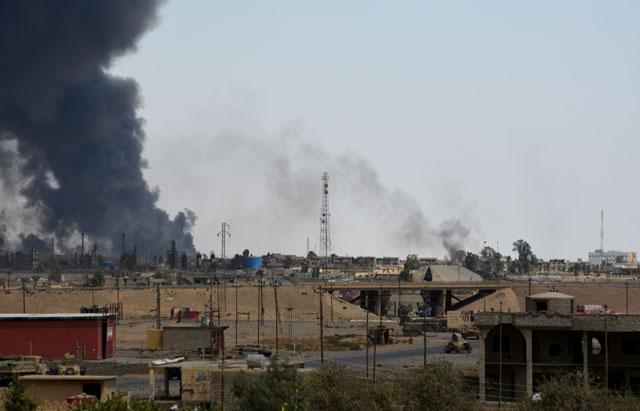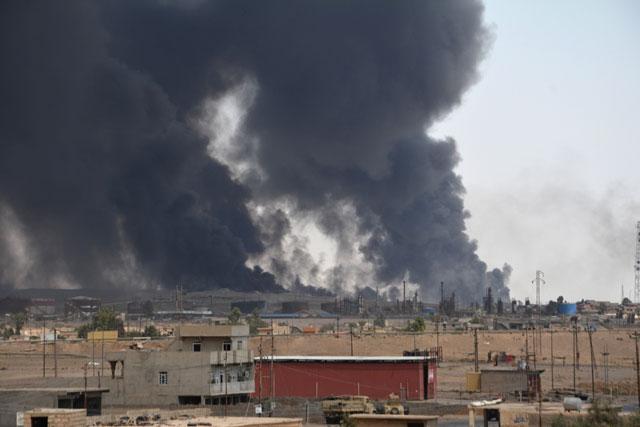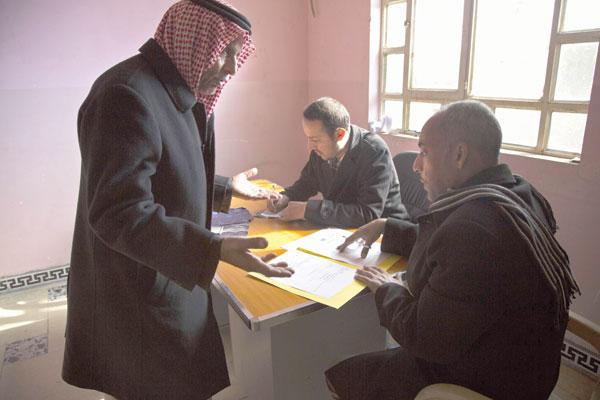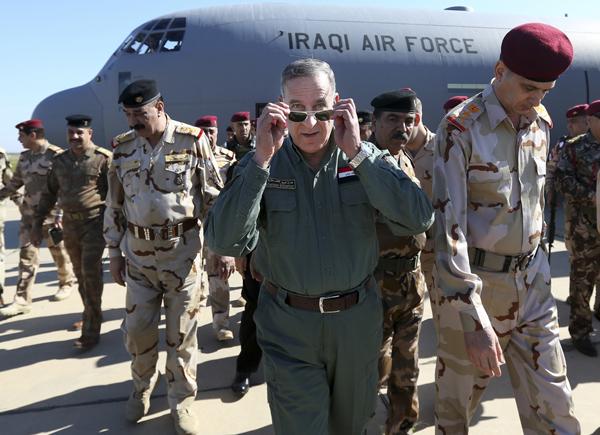You are here
Iraqi forces retake key town south of Mosul
By AFP - Aug 25,2016 - Last updated at Aug 25,2016

A general view shows smoke rises from the Qayyarah on Wednesday, as Iraqi forces took key positions in the centre of the city, officials said, on the second day of an operation to recapture the northern town from militants (AFP photo)
QAYYARAH, Iraq — Iraqi forces on Thursday pushed the Daesh terror group from Qayyarah, a northern town considered strategic for any future offensive against the extremists' last stronghold of Mosul.
Prime Minister Haider Al Abadi hailed the victory as a key step in the fight against Daesh but hours later suffered yet another political setback when lawmakers impeached his defence minister.
Special forces, backed by US-led coalition air strikes, wrapped up a three-day operation to retake Qayyarah, a town which lies on the banks of the Tigris River.
"We control all parts of the town and managed, in very limited time, to root out Daesh," Lieutenant General Riyadh Jalal Tawfik, who commands Iraq's ground forces, told an AFP reporter in Qayyarah.
The commander said engineering units were now clearing the town, which lies about 60 kilometres south of Mosul, of unexploded ordnance and booby traps.
Residents greeted the security forces under skies blackened by huge fires Daesh extremists set to nearby oil wells in recent days.
The bodies of suspected Daesh militants were strewn across some of the town's streets, especially around its southern entrance, which saw the worst fighting and significant destruction.
Abadi issued a statement hailing what he said was a key step towards reclaiming Mosul, Daesh's de facto Iraq capital and the country's second city.
"Our heroic forces achieved a big victory, an important step towards the liberation of Mosul," Abadi said.
"I present my congratulations to the Iraqi people for the liberation of the strategic town of Qayyarah and neighbouring areas," he said.
The prime minister's mood was unlikely to have remained upbeat very long however, with one of his key allies losing a no confidence vote by parliament moments later.
The house impeached Defence Minister Khaled Al Obeidi by 142 votes to 102 — and 18 abstentions — over corruption allegations.
Obeidi's downfall is the latest development in a bitter feud that erupted earlier this month with rival Sunni politician Salim Al Juburi, who is the parliament speaker.
Qayyarah residents cooperated
At a hearing in parliament, Obeidi answered graft accusations against him by saying they were trumped up because he had refused to be part of corrupt deals.
He fought back with his own allegations against Juburi and other lawmakers but the speaker escaped unscathed after an integrity committee dropped the case.
Unity in Iraq’s Sunni camp is seen as key to preparing an offensive against Mosul.
The operation against Qayyarah was launched on Tuesday and led by Iraq’s elite counter-terrorism service (CTS).
Iraqi forces had already recaptured a nearby airfield and Qayyarah is expected to become one of the main launchpads for an assault on Mosul in the coming weeks or months.
Officers have said the push into Qayyarah was coordinated with small groups of armed residents opposed to Daesh inside the town.
“The people were very cooperative, that is why none of them fled, they did not attack our forces and our forces did not hurt them,” General Tawfik said.
A CTS spokesman confirmed that pro-government sleeper cells were involved in the operation but would not provide further details.
Daesh has suffered a string of military setbacks over the past year and lost more than half of the territory it controlled two years ago, in a trend that looks irreversible.
The extremists are vastly outnumbered and outgunned in the Mosul area but, besides the obstacles raised by a divided political class, Iraq also faces an unprecedented humanitarian crisis.
Around 3.4 million people have already been forced to flee their homes by conflict since the start of 2014.
The United Nations’ refugee agency warned this week that an offensive on Mosul could displace another 1.2 million people and cause a major disaster.
Related Articles
KIRKUK, Iraq — Iraqi forces on Wednesday closed in on the centre of Qayyarah, officials said, on the second day of an operation to recapture
QAYYARAH, Iraq — In Qayyarah, Iraqis are thronging a civil court to get married a second time, register births and replace the documents the
BAGHDAD — Iraqi lawmakers on Thursday voted to impeach Defence Minister Khaled Al Obeidi over corruption allegations, MPs said.Obeidi lost a














